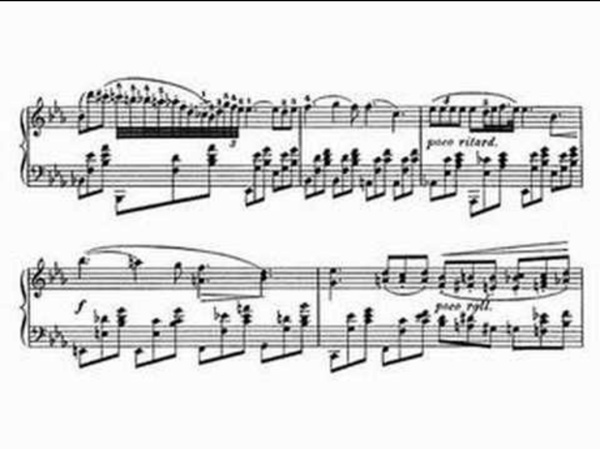



http://www.youtube.com/watch?v=YGRO05WcNDk
Frédéric Chopin Photograph of Chopin by Bisson, c. 1849 Frédéric François Chopin (/ˈʃoʊpæn/; French pronunciation: [fʁe.de.ʁik ʃɔ.pɛ̃]; 22 February or 1 March 1810 – 17 October 1849), born Fryderyk Franciszek Chopin,[n 1] was a Romantic-era Polish composer. A child prodigy, Chopin was born in what was then the Duchy of Warsaw. He grew up in Warsaw, which after 1815 became part of Congress Poland, and there completed his musical education and composed many of his works before leaving Poland, aged 20, less than a month before the outbreak of the November 1830 Uprising. Both in his native Poland and beyond, Chopin's music, his status as one of music's earliest 'superstars', his association (if only indirect) with political insurrection, his amours and his early death have made him, in the public consciousness, a leading symbol of the Romantic era. His works remain popular, and he has been the subject of numerous films and biographies of varying degrees of historical accuracy.
Ludwig van Beethoven Ludwig van Beethoven ( i/ˈlʊdvɪɡ væn ˈbeɪ.toʊvən/; German: [ˈluːtvɪç fan ˈbeːt.hoːfən] ( Born in Bonn, then the capital of the Electorate of Cologne and part of the Holy Roman Empire, Beethoven displayed his musical talents at an early age and was taught by his father Johann van Beethoven and Christian Gottlob Neefe. During his first 22 years in Bonn, Beethoven intended to study with Wolfgang Amadeus Mozart and befriended Joseph Haydn.
Nikolai Rimsky-Korsakov Portrait of Nikolai Rimsky-Korsakov in 1898 by Valentin Serov (detail) Rimsky-Korsakov believed, as did fellow composer Mily Balakirev and critic Vladimir Stasov, in developing a nationalistic style of classical music. This style employed Russian folk song and lore along with exotic harmonic, melodic and rhythmic elements in a practice known as musical orientalism, and eschewed traditional Western compositional methods. However, Rimsky-Korsakov appreciated Western musical techniques after he became a professor of musical composition, harmony and orchestration at the Saint Petersburg Conservatory in 1871. He undertook a rigorous three-year program of self-education and became a master of Western methods, incorporating them alongside the influences of Mikhail Glinka and fellow members of The Five.
Franz Schubert 1875 oil painting by Wilhelm August Rieder, after his own 1825 watercolor portrait Franz Peter Schubert (German pronunciation: [ˈfʁant͡s ˈʃuːbɐt]; 31 January 1797 – 19 November 1828) was an Austrian composer. In a short lifespan of less than 32 years, Schubert was a prolific composer, writing some 600 Lieder, ten complete or nearly complete symphonies, liturgical music, operas, incidental music and a large body of chamber and solo piano music. Appreciation of his music while he was alive was limited to a relatively small circle of admirers in Vienna, but interest in his work increased significantly in the decades immediately after his death. Felix Mendelssohn, Robert Schumann, Franz Liszt, Johannes Brahms and other 19th-century composers discovered and championed his works. Today, Schubert is ranked among the greatest composers of the early Romantic era and, as such, is one of the most frequently performed composers of the early nineteenth century.
Sergei Prokofiev Sergei Prokofiev in New York, 1918 Biography[edit] Early childhood and first compositions[edit] Formal education and controversial early works[edit] As a member of the Saint Petersburg music scene, Prokofiev developed a reputation as a musical rebel, while getting praise for his original compositions, which he performed himself on the piano.[28][29] In 1909, he graduated from his class in composition with unimpressive marks.
Sergei Rachmaninoff Sergei Rachmaninoff Sergei Vasilievich Rachmaninoff (Russian: Серге́й Васи́льевич Рахма́нинов;[1] Russian pronunciation: [sʲɪrˈɡʲej rɐxˈmanʲɪnəf]; 1 April [O.S. 20 March] 1873 – 28 March 1943)[2] was a Russian composer, pianist, and conductor.[3] Rachmaninoff is widely considered one of the finest pianists of his day and, as a composer, one of the last great representatives of Romanticism in Russian classical music.[4] Early influences of Tchaikovsky, Rimsky-Korsakov, and other Russian composers gave way to a personal style notable for its song-like melodicism, expressiveness and his use of rich orchestral colors.[5] The piano is featured prominently in Rachmaninoff's compositional output, and through his own skills as a performer he explored the expressive possibilities of the instrument. Life[edit] Rachmaninoff at age 10
Igor Stravinsky Igor Fyodorovich Stravinsky (sometimes spelled Strawinsky or Stravinskii; Russian: Игорь Фёдорович Стравинский, transliterated: Igorʹ Fëdorovič Stravinskij; Russian pronunciation: [ˌiɡərʲ ˌfʲjodɐrɐvʲɪt͡ɕ strɐˈvʲinskʲɪj]; 17 June [O.S. 5 June] 1882 – 6 April 1971) was a Russian (and later, a naturalized French and American) composer, pianist and conductor. He is widely considered one of the most important and influential composers of the 20th century. Life and career[edit] Early life in the Russian Empire[edit] Igor Stravinsky, 1903 In 1905 he was betrothed to his cousin Yekaterina Gavrilovna Nosenko (called "Katya"), whom he had known since early childhood.[13] In spite of the Orthodox Church's opposition to marriage between first cousins, the couple married on 23 January 1906: their first two children, Fyodor (Theodore) and Ludmila, were born in 1907 and 1908, respectively.[14]
George Gershwin George Gershwin (September 26, 1898 – July 11, 1937) was an American composer and pianist.[1][2] Gershwin's compositions spanned both popular and classical genres, and his most popular melodies are widely known. Among his best known works are the orchestral compositions Rhapsody in Blue (1924) and An American in Paris (1928), as well as the opera Porgy and Bess (1935). Gershwin studied piano under Charles Hambitzer and composition with Rubin Goldmark and Henry Cowell. He began his career as a song plugger, but soon started composing Broadway theatre works with his brother Ira Gershwin and Buddy DeSylva. He moved to Paris to study with Nadia Boulanger, where he began to compose An American in Paris. After returning to New York City, he wrote Porgy and Bess with Ira and the author DuBose Heyward.